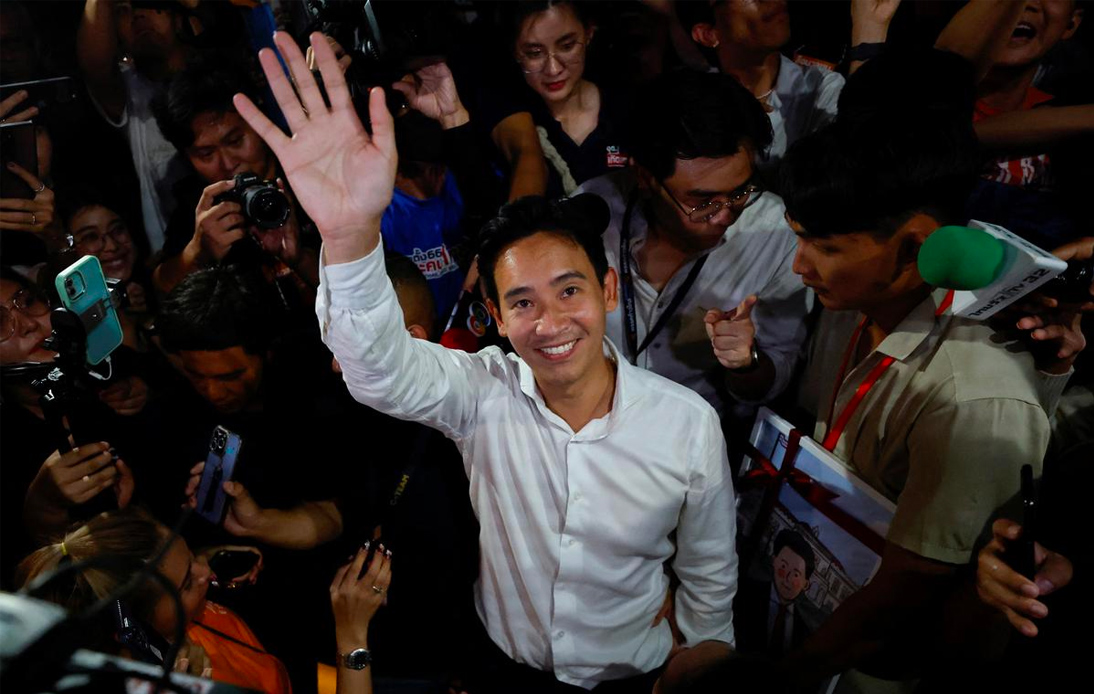
In his initial public address following the unexpected victory of his upstart political party last night, Pita Limjaroenrat showed confidence in his capability to assemble a governing coalition and move forward with its agenda to transform Thailand – including its monarchy.
Pita formed an alliance with six opposition parties, including defeated Pheu Thai. He warned anyone considering to oppose the electorate’s decision that “it will be quite a hefty price to pay.”
“I am ready to be prime minister for all, whether you agree with me or don’t agree with me,” he declared to the media.
He affirmed that along with the Prachachat, Thai Sang, and Seri Ruam Thai parties, they possess 309 of 500 votes in the lower house and expressed confidence in gaining support in the upper house. “I feel safe to assume we will be able to establish a majority.”
However, this goal still poses a significant challenge. The entire upper house, comprising 250 senators, is selected by the military, each member of which can vote for the upcoming prime minister.
Achieving power from the military may require a total of 375 votes. When questioned about his party’s commitment to revamp the monarchy, Pita was straightforward.
“We’re going forward with the lese majeste amendment in the parliament,” he asserted, adding that they have the requisite legislative support to advance it, unlike the previous occasion when it struggled under procedural regulations.
“The house didn’t allow it to happen, or some hiccups along the way, but we’ll pass that in this parliament.”
He mentioned that he reached out to congratulate Paetongtarn Shinawatra on Pheu Thai’s performance and extended an invitation to join his coalition.
Move Forward’s victory in the popular vote showed the people’s desire to move on from past power struggles with the military and Shinawatra family.
“The sentiment of the area has changed,” he stated. “It was the right timing that people have been through enough of a lost decade, the past decade. Today is a new day.”
He mentioned several reasons for optimism to the Thai citizens who were discouraged by the decline of the past decade.
These reasons included a fully democratic future, a system that prioritizes policy over personalized politics, a decentralized government, a fair economy that works for everyone, and the ability to be flexible and respond to challenges like pandemics, climate change, and an aging society.
“These are the things that will make them feel they don’t want to go out of the country and be part of nation-building in this country,” he stated.
In discussing the international approach of his administration, Pita echoed his frequently used phrase, “new world order is no world order,” expressing that the foundation must be rule-based diplomacy.
He said smaller nations shouldn’t be dominated by larger ones, unlike the previous government’s rapport with Russia. He stressed the need for mid-sized nations, like Thailand, to work together for regional stability and global security.
Myanmar – Pita proposed establishing a humanitarian corridor between Thailand and Myanmar and working with the international community to support Myanmar in resolving its own conflict.
However, he pointed out that Thailand has a vital part in realizing ASEAN’s “five-point consensus,” which was declared two years ago to terminate the conflict. The Thai and Myanmar militaries share close relationships and a tendency to stage coups.
Accusations have been made against Thailand’s military for assisting in the capture and return of anti-coup pro-democracy activists who sought refuge across the border.
CHINA – With regard to China’s position in a progressively multipolar world, Pita suggested that Thailand should tackle issues based on mutual interests on an individual basis, without taking sides.
“We need to stick to the rules of what’s possible and not possible and be able to think of foreign policy more of an a la carte than a buffet,” he proposed.
However, he emphasized that Thailand needs to be a responsible “global citizen.”
“I think it’s really important for global citizens to stick together and ensure the future world operates on rules,” he continued. “To make sure that right is might, and might is not right.”




















